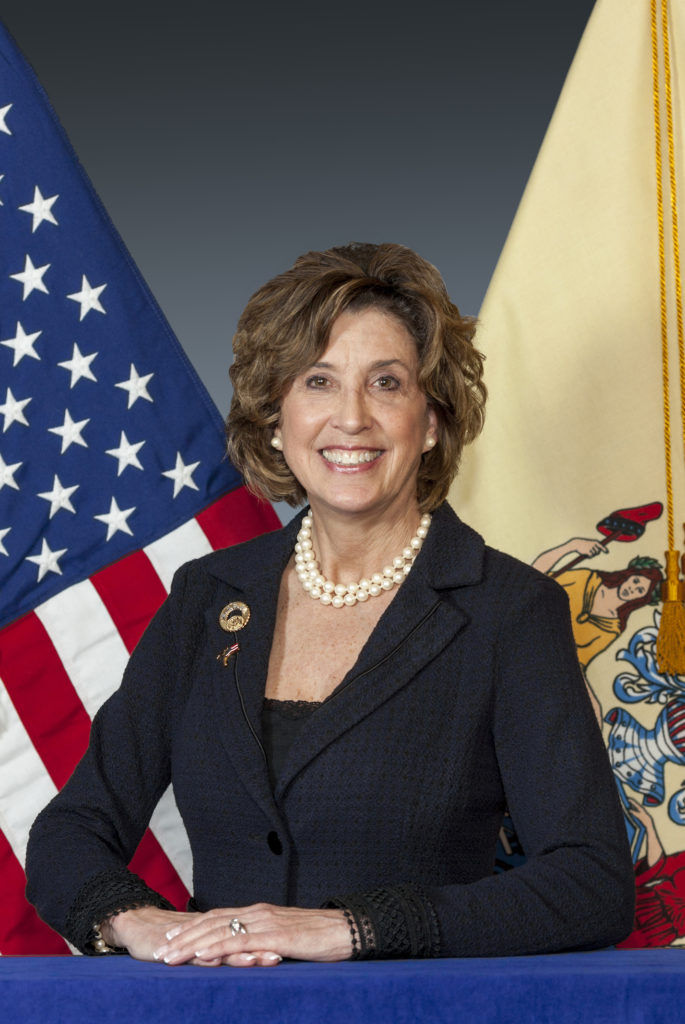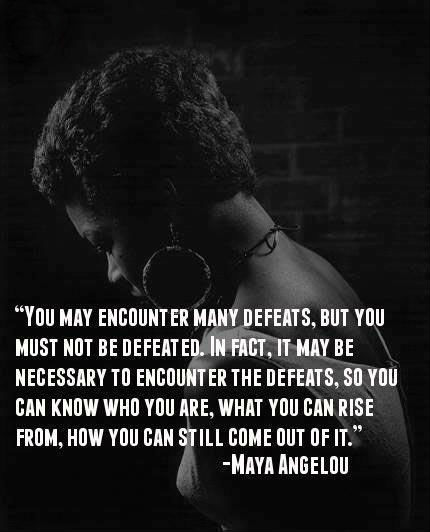We’re pleased to present the latest interview in our Common Ground campaign for Gender Equality, featuring Carol Ann Short. Carol is Chief Executive Officer at New Jersey Builders Association (NJBA) – and a true pioneer in so many ways. It’s been our honor to shine the spotlight this year on so many trailblazers like Carol, through our Common Ground campaign. These women are anything but common! They have paved the way for many other women to follow. Here’s to every achievement earned, every milestone passed, and every glass ceiling shattered!
CAROL ANN SHORT, Chief Executive Officer – NJBA, the leading trade association for the shelter industry in New Jersey
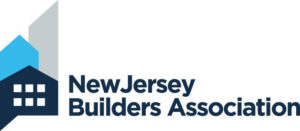 NJBA serves as a resource for its members through continuing education and advocacy. Under Carol’s leadership, the organization and its members strive for a more vibrant, greener, and affordable housing market in New Jersey. NJBA advocates for all types of housing opportunities, from entry level to luxury and mixed-use development. The organization provides educational, promotional and networking opportunities for professionals who make their living in the construction industry.
NJBA serves as a resource for its members through continuing education and advocacy. Under Carol’s leadership, the organization and its members strive for a more vibrant, greener, and affordable housing market in New Jersey. NJBA advocates for all types of housing opportunities, from entry level to luxury and mixed-use development. The organization provides educational, promotional and networking opportunities for professionals who make their living in the construction industry.
We spent some time chatting with Carol about her career and her experience as an attorney, lobbyist, and as CEO of NJBA. We also discussed her impressions of gender equality in the industry and her personal experiences and perceptions of women in the workforce. Scroll below to read any or all of Carol’s insightful responses and reflections.
Q: How did you get your start in the real estate industry?
 Following graduation from Temple University Law School, I passed the bar exam and was admitted to practice law in both Pennsylvania and New Jersey. I didn’t start out in the real estate business, but began my career in government affairs after an aggressive pursuit for a job inNew Jersey Governor Tom Kean’s office. I noticed a job posting on a bulletin board at Temple for potential clerkship positions in the governor’s office. So I got in my car, drove from Philadelphia to Trenton, to the State House, with my resume in hand. Long story short, after some degree of persistence and several interviews, I was offered a clerkship with the administration of Governor Kean as a deputy assistant counsel. Basically, I was responsible for reviewing, researching, and commenting on legislative initiatives that were under consideration in the legislation process. Those analyses then became recommendations that were ultimately presented to Governor Kean for his further review and consideration.
Following graduation from Temple University Law School, I passed the bar exam and was admitted to practice law in both Pennsylvania and New Jersey. I didn’t start out in the real estate business, but began my career in government affairs after an aggressive pursuit for a job inNew Jersey Governor Tom Kean’s office. I noticed a job posting on a bulletin board at Temple for potential clerkship positions in the governor’s office. So I got in my car, drove from Philadelphia to Trenton, to the State House, with my resume in hand. Long story short, after some degree of persistence and several interviews, I was offered a clerkship with the administration of Governor Kean as a deputy assistant counsel. Basically, I was responsible for reviewing, researching, and commenting on legislative initiatives that were under consideration in the legislation process. Those analyses then became recommendations that were ultimately presented to Governor Kean for his further review and consideration.
I didn’t know at the time, but in hindsight, I would have to say that this job was like hitting the lottery in terms of career development. I had a law degree, but no experience in government or politics – and then landed a job in the middle of what was probably the biggest political and legislative arena in the state of New Jersey!
That was the unlikely and surprising start of what I would call a wonderful career in government affairs and, ultimately, led to real estate.
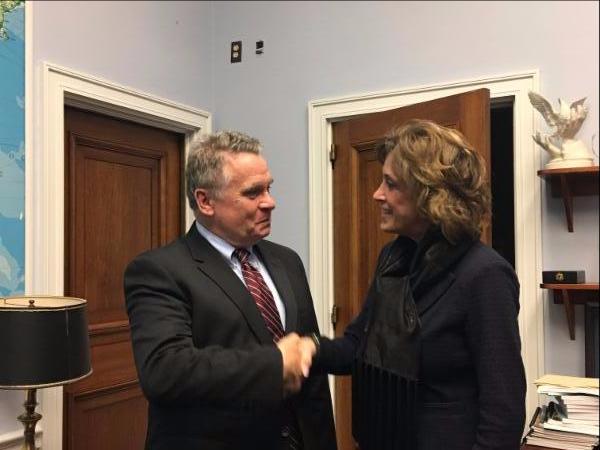
Carol Ann Short with Rep. Chris Smith, U.S. Representative for New Jersey’s 4th congressional district
Q: And where did you go from there?
After a year or so in that position, I was offered an opportunity to shift from the executive branch of government to the legislative branch. Specifically, I went to the New Jersey General Assembly Republican Office as a legislative committee researcher, responsible for staffing a variety of assembly committees, including the Housing Committee, the Judiciary Committee, the Law and Public Safety Committee, and the Banking Committee. Later, I also served as counsel for the assembly Republican Office. It was in my capacity as staff for the Assembly Housing Committee that I first had an opportunity to become familiar with the myriad of issues that impact the housing industry in New Jersey. The issues were varied and complex, ranging from considerations of many and diverse environmental regulations, to navigating New Jersey’s Municipal Land Use Law, with its overriding home-rule orientation and zoning considerations.
The representatives of the housing industry who testified before the various committee meetings were credible and passionate about housing New Jersey’s residents. That passion is what resonated with me.
NJBA Beginnings
When I was first approached and offered a government affairs position with the New Jersey Builder’s Association, I was thrilled to have the opportunity to learn more about the real estate industry, the construction and development of housing, the land use process, and how I could be a part of bringing housing to New Jersey’s residents. I was initially hired over 25 years ago as Executive Director of the NJBA’s Institute of Multi-Family Housing. This was an affiliate established to support the fast-growing condominium market at that time back in the late ‘80s. After about four years, I was torn about my direction with my career. Do I continue in government affairs with the NJBA, or do I go to private practice, utilizing my law degree in that regard? So, I decided to shift to a law firm to see if that was for me. I was still in the area of real estate – reviewing and drafting condominium documents and representing associations in the private sector; however, I realized very quickly that the law firm experience was not really for me. After about a year, my former boss approached me and offered me an expanded role as the Vice President of Government Affairs, responsible for the development and oversight of the entire association’s policy goals and objectives. Eventually, I was promoted to Chief Operating Officer and then to my current role as CEO.
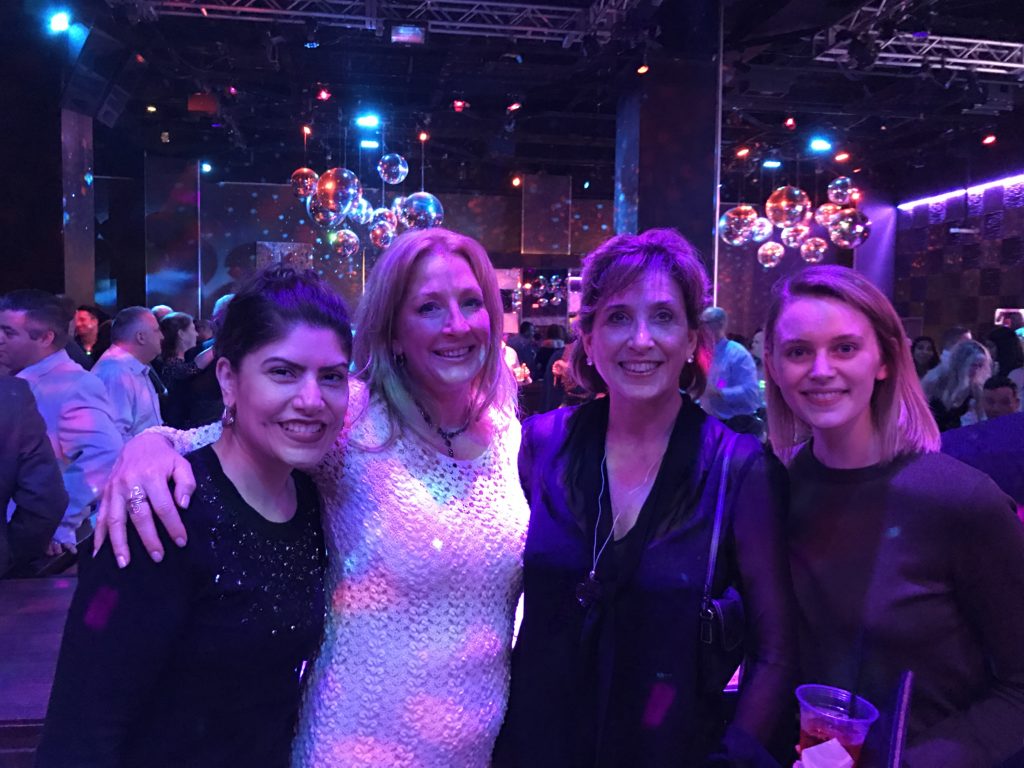
Carol Ann Short with members of our Pace team in Atlantic City at the 2017 Atlantic Builders Convention
Q: Did you or do you have any role models in the industry, or someone who influenced you in a significant way in the field?
 My true role model was not someone in the real estate industry or even in government affairs, but someone who greatly impacted my entire life, before I even began my professional career, and molded me into who I am today. The person who has had the biggest impact on me – who has truly inspired me, given me purpose, direction, and the strength to overcome every obstacle that has been placed in front of me during my career, and in fact in every aspect of my life – was my older brother, Marty. To this day, he has been my life inspiration and the most amazing person that I’ve ever met. I strongly believe that I could not have accomplished the things in my career if I had not been inspired by him. Marty was just 23, and I was 22, when he was tragically killed in an automobile accident. He had just graduated from the University of Maryland, had his Engineering degree, was working on his Master’s Degree at NYU – he was smart, athletic, handsome; so full of life. And he had an amazing career ahead of him. I knew at that moment that I had not only lost the most important person in my life, but everything that I had thought and dreamed of for my future had just come to an abrupt halt.
My true role model was not someone in the real estate industry or even in government affairs, but someone who greatly impacted my entire life, before I even began my professional career, and molded me into who I am today. The person who has had the biggest impact on me – who has truly inspired me, given me purpose, direction, and the strength to overcome every obstacle that has been placed in front of me during my career, and in fact in every aspect of my life – was my older brother, Marty. To this day, he has been my life inspiration and the most amazing person that I’ve ever met. I strongly believe that I could not have accomplished the things in my career if I had not been inspired by him. Marty was just 23, and I was 22, when he was tragically killed in an automobile accident. He had just graduated from the University of Maryland, had his Engineering degree, was working on his Master’s Degree at NYU – he was smart, athletic, handsome; so full of life. And he had an amazing career ahead of him. I knew at that moment that I had not only lost the most important person in my life, but everything that I had thought and dreamed of for my future had just come to an abrupt halt.
Every aspect of my life changed in that one, brief instant. It was truly a defining moment in my life. I had to decide which direction to go at that point – and I made a conscience decision to move forward.
Moving Forward
I had been accepted to law school and I contemplated at that point not going forward with it. But I decided to go forward and go to law school; to be productive and to be hardworking and successful and to accomplish what I could in life for both of us. You know the old adage, ‘What doesn’t kill you only makes you stronger’? I really believe that. I have become a very strong individual; a strong woman, a strong person. But it was different in that it was by necessity, not by design. I was an extremely shy, introverted person before. It was at that time that I developed a true sense of resolve in my life. This tremendously painful life event prepared me for every difficult and challenging experience that was to come my way in life. I now had a real perspective on what was important in life. So in that regard, my brother has been my biggest inspiration. My life has been defined by my loss and this has provided me the strength and impacted not only my career, but every aspect of my life.When you have that real guiding sense of perspective, it’s such an advantage. It gives you the ability to make good choices; knowing what’s important and not important, and overcoming obstacles. So I took this loss and I turned it into something beneficial for my life, within the career and outside of the career. And I do believe he is with me every step of the way. I am blessed to have had the opportunity to have known him and loved him for 23 years.
Q: In addition to this tragic loss, what are some other obstacles or challenges you faced along the way on your career path?
 Once I became an attorney and was pursuing my career, I was faced with yet another personal challenge that affected my career. In my pursuit of a family, for about a five-year period, I was confronted with infertility. I underwent a regimen of fertility treatments, including doctor visits, medications, procedures, surgeries, adoption options, IVF, etc. – basically an emotional rollercoaster for almost a five-year period. At that point in my life, the decisions I made in my career were based on what was in the best interest of my pursuit of a family. So career advancement was basically on hold as much as it had to be so I could pursue my life dream of becoming a mother. This challenge further strengthened my will and my desire to succeed. Fast forward a few years, I was successful, I was able to become the mother of three beautiful sons. Once I had my family, my three young children, I found myself confronted with decisions like every other working mother – decisions about balancing my career and my family life. I was presented with alternative career opportunities, which meant increased compensation and potential advancements, but that also came with increased time away from home and my children. I can’t say that I struggled or had to compromise in any way because, after what I went through, my priorities were very clear. It was very easy for me. My family came first. I knew that whatever I did, I would be able to succeed – whatever the career that I chose, whatever decision I chose to go from that point – as long as I knew that my decision was ultimately in the best interest of my children.
Once I became an attorney and was pursuing my career, I was faced with yet another personal challenge that affected my career. In my pursuit of a family, for about a five-year period, I was confronted with infertility. I underwent a regimen of fertility treatments, including doctor visits, medications, procedures, surgeries, adoption options, IVF, etc. – basically an emotional rollercoaster for almost a five-year period. At that point in my life, the decisions I made in my career were based on what was in the best interest of my pursuit of a family. So career advancement was basically on hold as much as it had to be so I could pursue my life dream of becoming a mother. This challenge further strengthened my will and my desire to succeed. Fast forward a few years, I was successful, I was able to become the mother of three beautiful sons. Once I had my family, my three young children, I found myself confronted with decisions like every other working mother – decisions about balancing my career and my family life. I was presented with alternative career opportunities, which meant increased compensation and potential advancements, but that also came with increased time away from home and my children. I can’t say that I struggled or had to compromise in any way because, after what I went through, my priorities were very clear. It was very easy for me. My family came first. I knew that whatever I did, I would be able to succeed – whatever the career that I chose, whatever decision I chose to go from that point – as long as I knew that my decision was ultimately in the best interest of my children.
I do believe women can have it all, but when you say “have it all,” as a career woman and a mother, you need to identify what it is you’re looking for; what it is you want out of life. Prioritize those things and then go for it.
Working Moms
For me, it wasn’t about choosing career or family; it was saying family came first, my children came first, from there now I’m going to pursue my career and success. Some of my colleagues would say working mothers can’t have it all, because when they’re at work they think they should be home with their children to be a good mom; and when they’re home, they think they’re not achieving all that they can. They’re conflicted in their roles. Personally, that was never a conflict for me because I put my children first and my family first, so it was very easy.
Having entered a male-dominated career path, not just in terms of the real estate business but also government affairs and lobbying, the fact that there were not many female role models in either of these areas added to the challenges that I confronted.
I’m going back to the ‘80s and ‘90s, when the halls in Trenton were dominated by the “good old boys” who had been around for decades. That was very obvious when I first started. Literally, the halls were filled with men – and while many of them were respectful and welcoming, there were certainly many who were not. Many decisions were made with a slap on the back and often behind closed doors in smoke-filled rooms. You don’t see that a lot any more. Breaking through that barrier was very challenging. It took thick skin, it took persistence, which is something I’ve been drilling into my three sons from the day they were born: that persistence is key. Hard work, and the good old stick-to-itiveness. To me, it meant that I needed to work harder and to be more prepared than others. After some time, a decade or more, I witnessed a number of changes. More and more women were entering the fray. The number of attorneys in the field was increasing dramatically, including both men and women, and I think that also helped, and the world began to change.
Q: Have you seen a change in gender equality since you started in the field?
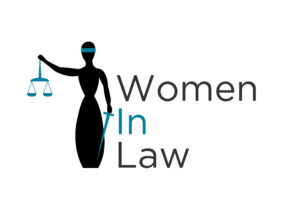 I do think it’s changing. In law school, I didn’t see the division that much because by that point, law schools were pretty much 50/50 men and women. Everybody was there for the same purpose, accomplishing the same goals, and getting the same degree. It wasn’t until I left law school and went to my first job in the governor’s office, that I noticed in lobbying and in government affairs, a very big difference in the way women were perceived. I was hired as an attorney in a room with about a dozen other law clerks, men and women, and they all seemed to treat each other the same. But it was outside of that position, in a more general setting, where I noticed there were fewer women and less acceptance of women. It was more in the lobbying where it wasn’t as prevalent. When I would meet lobbyists that had been around for decades – and this was “old school” lobbying; it wasn’t as regulated at that point and there were no requirements to become a lobbyist – whenever someone would ask me for my card or I would give my card to someone who was a lobbyist and had been there for years, they would take the card and I noticed this eyebrow raise, as if to say, “Oh, you’re a lawyer?” And then maybe a little bit different treatment from that point forward. That was something I noticed I needed to pay attention to. It affected the way I carried myself moving forward.
I do think it’s changing. In law school, I didn’t see the division that much because by that point, law schools were pretty much 50/50 men and women. Everybody was there for the same purpose, accomplishing the same goals, and getting the same degree. It wasn’t until I left law school and went to my first job in the governor’s office, that I noticed in lobbying and in government affairs, a very big difference in the way women were perceived. I was hired as an attorney in a room with about a dozen other law clerks, men and women, and they all seemed to treat each other the same. But it was outside of that position, in a more general setting, where I noticed there were fewer women and less acceptance of women. It was more in the lobbying where it wasn’t as prevalent. When I would meet lobbyists that had been around for decades – and this was “old school” lobbying; it wasn’t as regulated at that point and there were no requirements to become a lobbyist – whenever someone would ask me for my card or I would give my card to someone who was a lobbyist and had been there for years, they would take the card and I noticed this eyebrow raise, as if to say, “Oh, you’re a lawyer?” And then maybe a little bit different treatment from that point forward. That was something I noticed I needed to pay attention to. It affected the way I carried myself moving forward.
I made sure to hand my cards to people and to use the “Esq.” – to make sure people knew I was an attorney – because I needed to convey my level of professionalism, to be treated the same. That’s where I saw a gender difference. So I had to equalize that and be a little more assertive with my education and my position as an attorney.
Gender Inequality in Government Affairs, Lobbying & Real Estate
I believe that workplace gender equality is achieved when people are able to access and enjoy the same rewards, resources and opportunities, regardless of gender. When there is gender inequality, women are less likely to succeed, advance in their careers, or be paid equivalent salaries as men. In the field of government affairs and lobbying, there are practical considerations inherent in the job. The nature of the job, the lifestyle itself, may not be conducive for women in a traditional role. If you’re child-rearing and you want to be home with your children, many political events occur outside the scope of the traditional work day. There are a lot more morning hours, late evening hours, etc., and it might be more difficult for women to meet the demands of a government affairs position or schedule, if they are pursuing a family and raising children. So by definition, I think there is some gender inequality in this field and it’s something that women, if they choose to do this, need to overcome. But I have seen a tremendous change in gender equality since I began my career in the late ’80s. The world of government affairs has changed dramatically. It’s become much more regulated and much more professional, with many more women and attorneys becoming actively engaged. In the government affairs world, you can be as I am, an industry representative; or you can be a contract lobbyist. Across the board, there are more women and more attorneys in the area of contract lobbyists.
But the real estate industry remains underrepresented by women today. I am still often in a room of men, with one or two other women in the room. So while there are more women than there were decades ago, the real estate industry itself is still a career that is very much dominated by men.
Q: What’s one major milestone or achievement you can share from your career?
One major milestone in my career was the enactment of a law. It was the state’s Uniform Residential Site Improvement Standards Act, back in 1993. This established state-wide requirements for improvements made in connection with residential development, including streets and parking, water supply, sanitary and sewers, and storm water management. This was a major legislative victory for the association and its membership and continues to save applicants and developers thousands of dollars in unnecessary added costs. This achievement was one of the victories in a larger legislative movement, which was also a milestone. We called it the “Fix the Hammer” campaign back in ’92, when we got a half-dozen bills through the legislature, signed into law. It was a package that was promoted in an effort to get the economic engine back on track in New Jersey. The economy had gone down, New Jersey was really losing jobs, people were losing economic advantages at that time, and it really needed the real estate industry. It’s the real estate industry historically that has gotten not only New Jersey, but every other state and the nation out of any economic downturn. Governor Florio signed each piece of this legislation in front of hundreds and hundreds of people. It was something I’ll never forget. It was massive – it was a big change in New Jersey. Since that point, there have been a number of legislative victories that we internally drafted within this association, moved through the legislative process, and had signed into law. It’s watching the change and the implementation of these laws and how it not only changes business and gets the economy moving, but how it impacts the entire state and the residents and how it changes the world that you live in, that I find fascinating. That’s why I’m so passionate about it. What I do actually makes a difference.
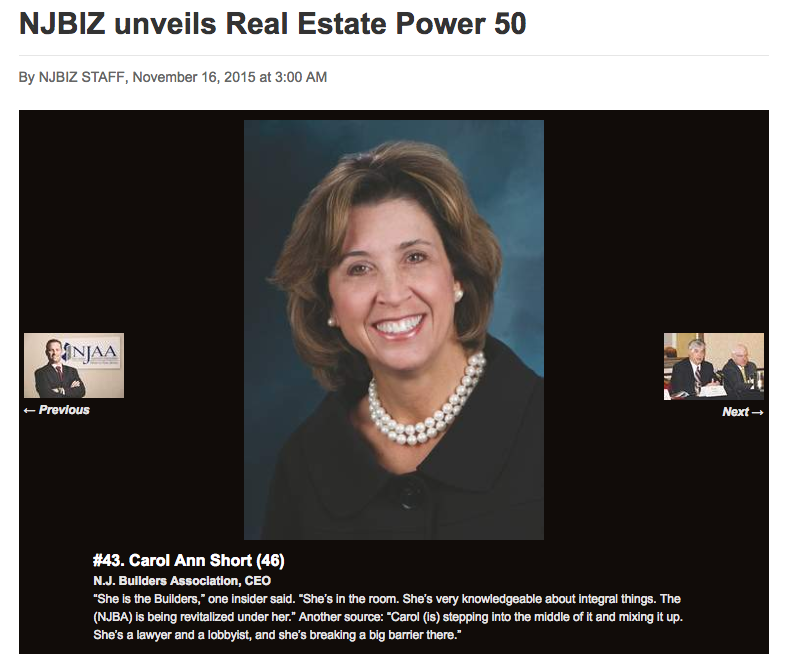
Carol has been named among the “Real Estate Power 50” by NJ Biz – just one of many milestones in her successful career!
Q: Is there something you would still like to accomplish in your career?
We always have legislation that we want to move forward. There’s always another bill we’re working on, like amendments to the municipal land use law to make things more efficient and effective. Beyond getting legislation passed, I know that there’s something else in store for me. Maybe I would like to even step out of government affairs or go to a different career path in the real estate world – something completely outside of this world, to explore something new. I’m open to discovering something completely different, but time will tell. I’m open to it and looking forward to it!
Q: What advice would you give to women who may be starting out, trying to break in, or trying to advance in the field?
Because of my experience and my past, becoming an attorney and noticing the almost immediate respectability that comes with that, I have given advice to a lot of young women. I suggest to women who are starting out, or who are attempting to break into any field, that they may want to consider getting a law degree. I really believe that an advanced law degree is extremely beneficial to everyone. But I think it’s even more beneficial to women, because women still encounter gender inequality in the workplace.
We may say “you’ve come a long way baby,” but I still think there’s a long way to go. Until gender inequality is completely eviscerated, until you don’t see that, I think we as women need something to counter that – and added education is an additional tool that can combat gender inequality. A law degree brings with it automatic respectability, a sense of academic and intellectual accomplishment which otherwise may not be assumed in certain situations.
It’s not just for that purpose, because with a law degree comes inherent additional experience or education that will transcend whatever you do. It also brings with it a sense of confidence and security, which you might find challenged in certain positions where you might find yourself questioning whether you can achieve something. With that law degree, you have that sense of accomplishment. It can only help to further women in the workplace, no matter what the challenges. It’s an investment in yourself and an investment in the future.
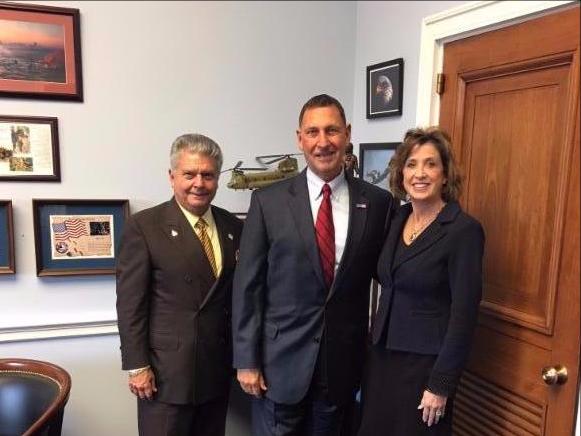
Carol Ann Short with (L-R) Dean Mon, NAHB Area 3rd Vice Chair; & Congressman Frank LoBiondo of New Jersey’s Second Congressional District
Q: As part of our campaign for gender equality, we’re working with Bottomless Closet, a local non-profit that helps disadvantaged women who are transitioning from unemployment and public assistance into the workplace. Do you have any words of encouragement or advice for these women who are attempting to find work and establish a career – in any field – in spite of severe hardship?
The advice I would give I actually found in a quote from Maya Angelou:
I thought that was such a simple, but truthful, statement and that it would provide confidence and might motivate someone in that position.
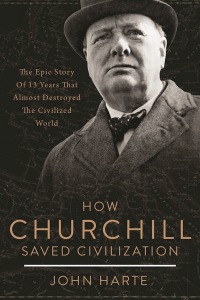 Q: Last question, on a more lighthearted note: tell us the last great book you read or show you binged…
Q: Last question, on a more lighthearted note: tell us the last great book you read or show you binged…
I am in the middle of reading How Churchill Saved Civilization by John Harte right now. A former boss of mine was always quoting Churchill and for the last five years, I kept saying “I am going to read one of these books” because there are so many great quotes that he would have. I’m in the process of reading that, but I’m really enjoying it. And, I can generally be found binging on Homeland and Billions – I love those. I have to say, in the real estate industry, the movie that I really enjoy is The Big Short.


